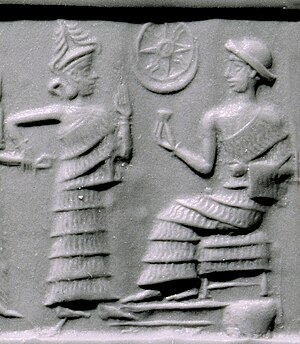
Back ኢቢ-ሲን Amharic إبي سين Arabic ابى سين ARZ Ібі-Суэн Byelorussian Ibbi-Sin Catalan Ibbi-Sin German Ιμπί Σιν Greek Ibbi-Sin Spanish ایبی-سین Persian Ibbi-Sin Finnish
| Ibbi-Sin 𒀭𒄿𒉈𒀭𒂗𒍪 | |
|---|---|
 Ibbi-Sin enthroned, with standing goddess. | |
| King of the Neo-Sumerian Empire | |
| Reign | c. 2028–2004 BCE
(Middle Chronology) c. 1964–1940 BCE (Short Chronology) |
| Predecessor | Shu-Sin |
| Successor | Kindattu (Elamite) |
| Dynasty | Third Dynasty of Ur |
| Father | Shu-Sin |
Ibbi-Sin (Sumerian: 𒀭𒄿𒉈𒀭𒂗𒍪, Di-bi₂-Dsuen), son of Shu-Sin, was king of Sumer and Akkad and last king of the Ur III dynasty, and reigned c. 2028–2004 BCE (Middle chronology) or possibly c. 1964–1940 BCE (Short chronology). During his reign, the Sumerian empire was attacked repeatedly by Amorites. As faith in Ibbi-Sin's leadership failed, Elam declared its independence and began to raid as well.[1]
Ibbi-Sin ordered fortifications built at the important cities of Ur and Nippur, but these efforts were not enough to stop the raids or keep the empire unified. Cities throughout Ibbi-Sin's empire fell away from a king who could not protect them, notably Isin under the Amorite ruler Ishbi-Erra. Ibbi-Sin was, by the end of his kingship, left with only the city of Ur. In 2004 or 1940 BCE, the Elamites, along with "tribesmen from the region of Shimashki in the Zagros Mountains"[2] sacked Ur and took Ibbi-Sin captive; he was taken to the city of Elam where he was imprisoned and, at an unknown date, died.
© MMXXIII Rich X Search. We shall prevail. All rights reserved. Rich X Search